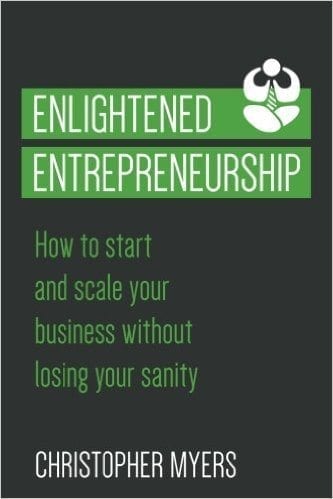How to Keep Your Sanity as an Entrepreneur

Maintaining the balance between life and work is one of the most common challenges entrepreneurs face. The expectations and pressures associated with startup businesses can be tremendous. So it’s not surprising that many entrepreneurs struggle to keep all aspects of their lives in balance as they strive to make their business a success. Myers, the co-founder and CEO of BodeTree, a financial management tool for small businesses, shares deeply personal essays about his journey as an entrepreneur. His insights are designed to convince small-business owners that they can grow their business without “selling (one’s) soul.”
The book contains three sections: Starting Your Business, Scaling Your Business, and Staying Sane. The book includes insights both from the BodeTree experience as well as insights gleaned from essays on diverse subjects such as Ikea’s approach to the user experience to what Myer calls the “adorable puppy principal.”
Starting Your Business, Scaling Your Business
In the first section, Myers provides advice on growing both a business and a brand, with chapters focused on pre-business considerations, company growth, product development, marketing and recognition, and gaining traction. The second section takes a more detailed look at the functional areas of a business, including day-to-day functions of a CEO, pitfalls, and opportunities for growing your business, start-up funding challenges, managing people and when to exit the business.
Sanity in a Business Context
It is in the last section that Myers, a frequent contributor to Forbes, differentiates himself. Chapters here look at managing yourself, finding balance, leadership lessons, and managing anxiety and depression.
“One thing I’ve come to realize is that everything, good or bad, starts in the mind,” Myers writes. “What you think is, in fact, what you become. If you focus on balance, self-awareness, and humility, those traits become part of how you run your business.”
In a recent Forbes article, Myers discussed the susceptibility entrepreneurs have to the negative effects of persistent stress. He explained that while vacations and mindfulness exercises provided temporary relief from the stress of starting his company, moments of peace could be fleeting.
Myers argues that you should work at changing the patterns that follow a stressor. According to him, a stressful stimulus prompts a response, often in the form of negative thoughts or feelings. In turn, those thoughts and feelings can spur a physical response, from sweaty palms to upset stomachs to a quickened pulse.
For Myers, poorly received sales presentations were a constant source of stress. He took such responses as a personal offense. It seemed that it wasn’t the product that wasn’t liked, it was him.
He eventually began adjusting his mindset. Negative feedback and rejection were information he could use to improve the presentations. Myers began deconstructing those interactions, looking for the reasons why a pitch was rejected.
He also began changing some of his behaviors in reaction to that stress. Myers stopped dwelling in hypotheticals and addressed the issues in the presentations head on.
While it’s true that many entrepreneurs may need to rethink their business models, Myers suggests that the best approach is to rethink your thinking. The book provides insights that can help you succeed in business as well as in your personal life. Put simply, Myers’ book truly can lead to enlightened entrepreneurship.
